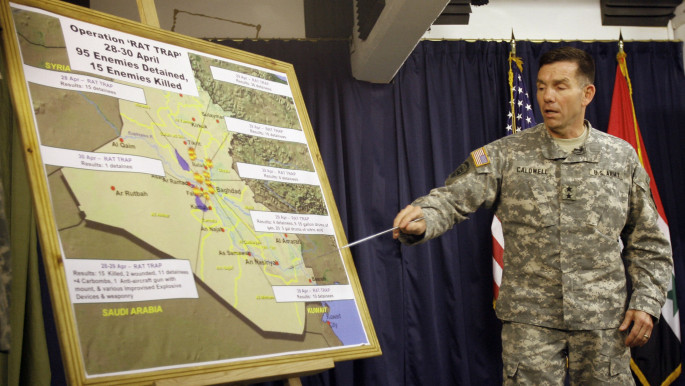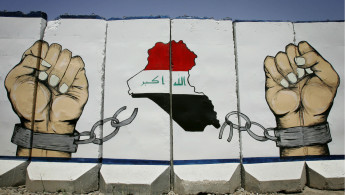Partitioning Iraq?
An old ghost is returning to Iraq; legal and constitutional processes are being put in place to partition the country.
With sectarian war spreading across the country from north to south, what is known to some as “Biden’s project” after US vice president Joe Biden - to partition Iraq into three semi-autonomous regions of Sunni, Shia and Kurd - is once again gaining momentum and has become the subject of intense political debate. This is due to the failure to consolidate power in the hands of Baghdad’s central government, and restore security based on a centralised system.
The idea of partitioning Iraq in this way while keeping Baghdad as the capital was presented by US Vice-President Joe Biden to the United States Senate in 2006 when he was still just a senator from Delaware. The bill was rejected by then-President George W Bush’s administration, as well as the rest
| Iraqi political organisations that had previously rejected partition are now spearheading the plan |
of the Republicans, alongside Sunni and Shia political circles in Iraq - but it was welcomed by Kurdish representatives.
Iraqi political organisations that had previously rejected partition are now spearheading the plan. The debate is largely taking place between Sunni and Shia, as the autonomy of the Kurdish region has been a fait accompli since 1991.
Shifting sands
One party that has changed its position is the Iraqi Islamic Party, the Iraqi wing of the Muslim Brotherhood. It has only agreed to participate in the next government if parliament votes on a draft of the plan. The National Movement, led by Osama al-Nujaifi, and his brother, Athil al-Nujaifi – the speaker of Iraq’s parliament - as well as leaders of the Anbar-based Awakening movement, have also welcomed the draft bill.
Sunni parties and Arab movements that support the proposal argue it represents the best solution for all of Iraq’s problems. Additionally, some leaders of the ruling National Coalition, the largest representative of Arab Shias, consider the bill to be coming from Iraq’s friends and allies.
However, there has been strong opposition from some politicians and members of the public, as well as neighbouring countries. They believe the plan will be difficult to implement for geographical reasons, and because ethnic groups are spread across the three regions. For example, it ignores the fate of the Sunnis in Basra, even though they make up 35 percent of its population, the Sunnis in Wasit, Babil and Dhi Qar, and the Iraqi Shias in Diyala, Nineveh or Saladin. It also ignores the Christians, Mandaeans and Yazidis, and over a million Turkmen living in Iraq.
Dividing the spoils
According to the plan, the Sunni region would make up 49 percent of Iraq, and include the provinces of Anbar, Diyala, Nineveh, Saladin, and the areas to the south and west of Kirkuk. Anbar alone makes up 33 percent of Iraq’s total area (434,290 sq. km), and borders Jordan, Turkey, Saudi Arabia and Syria. The Shia region would include the provinces of al-Qadisiyah, Babel, Basra, Karbala, Maysan, Muthana, Najaf, Theeqar and Wasit, cover 31 percent of Iraq’s total area, and border Iran, Kuwait and Saudi Arabia. Kurdistan would remain the same size, covering 20 per cent of Iraq’s total area and bordering Iran, Turkey and Syria.
There are significant differences between the three regions in terms of natural resources. The 2005 Iraqi constitution stipulates: “Any governorate or group of governorates has the right to hold a referendum to establish a region with independent administrative and financial rules to benefit from its natural resources.” Each region has natural resources not found in the other regions or, if it can be found, only in small quantities. For example: oil in the south, gas in the north and the west, and water in Kurdistan. This means that partitioning is likely to lead either to conflict or cooperation.
 |
|
|
[Getty] |
The plan seems to be gaining momentum, drawing strength from sectarian tensions, disillusionment with politicians, and the failure of successive governments to achieve national reconciliation. Observers believe that population movement as sects consolidate their communities is also speeding up the partitioning process.
Federalisation or partition?
Baqir al-Zubeidi, a leading figure in the National Coalition, which has a Shia majority, supports the idea. “The federal system is the solution, everyone will have to accept it because it will become a reality,” he said. But his bloc says it does not support Biden’s plan to divide the country based on ethnicity or sect, only on a geographical basis.
In contrast, Mohamed al-Zawbaie, a leading figure in the Iraqi Islamic Party, told al-Araby al-Jadeed: “Regionalising Iraq is a bitter pill to swallow, but we are dealing with a situation much more dangerous than partitioning Iraq. If things remain unchanged the country could fragment, leading to a conflict that could last years. We believe this is the best solution that would bring security and stability, as well as end the oppression and injustice suffered by Sunnis over the past years.” He also argued that regionalisation would end the “growing Iranian tide and with it the attempts to export the Iranian revolution”.
The most prominent Arab Sunni cleric in Iraq, Sheikh Abdul Malek al-Saadi, said the plan was made to “divide, destroy and weaken the country”. Refusing to view developments as a conflict between different sectors of society, he blamed “the implementation of foreign agendas”.
The Association of Muslim Scholars (AMS) in Iraq agrees with Saadi, and sees Biden’s plan as a new Sykes-Picot deal. However, the AMS has little influence over the political discussion of the plan. The same applies to several Shia groups who have been deliberately excluded from talks.
Lofty ambitions
The plan aims to eradicate sectarian strife; grant each sect the freedom to implement their own laws and benefit from resources in their region; make revenues from resources stay in each region; ensure production revenues are equally distributed between the governorates in each region and increase the pace of development.
| Opponents of the plan believe regionalisation is the first move towards partitioning |
Opponents of the plan believe regionalisation is the first move towards partitioning the country into three independent states. They foresee the transition as being accompanied by bloody wars for control over each region, as seen with the Kurdish civil war in the 1990s and border conflicts with neighbouring countries.
They also argue it will weaken the country, and turn Shia areas in the south into “Iran’s backyard”. The Sunni region may also be weakened by the ambitions of the Islamic State group (formerly known as ISIS) to establish an Islamic Caliphate in the region. Opponents believe that instead of partitioning there needs to be a political solution that includes redrafting the constitution, excluding current politicians from the decision-making process and building a national army that represents all society.
A national solution, but an international problem
Al-Araby al-Jadeed has seen leaked reports from Baghdad showing Iran’s support for the plan. But Saudi Arabia and Jordan argue that regionalising Iraq will directly threaten regional stability.
Sociologist Hadi al-Ghureiri from Baghdad University told al-Araby al-Jadeed that partitioning Iraq based on sect would make each region dependent on neighbouring countries sharing the same sectarian composition. This, he suggests, may turn Iraq into a battlefield between regional powers, and explains why Saudi Arabia, Jordan and even Egypt have reservations about the plan. Amr Moussa, former secretary general of the Arab League, even issued a statement saying that Biden’s plan posed a grave danger to the entire region.
The issue, however, does not seem to be about opponents or supporters of the plan, but about the small steps being taken towards regionalisation. For example, areas with a Sunni majority are now completely outside central government control, in contrast to the Shia south.
Several factors suggest that an announcement will soon be made about the beginning of official discussions to implement the plan. The US has finally declared its support; the plan’s proponents now control the political situation; demographic movement between regions according to sect is growing, while sectarian strife is making people increasingly desperate for a solution.
Regionalising Iraq could, however, be avoided if Haider al-Abadi’s government agrees to the demands of the Sunni community - particularly the restructuring the army and rewriting the constitution - but this cannot happen without a great deal more stability in this embattled country.
This is an edited translation from our Arabic edition.



